Exclusion Clause and Misrepresentation in Contract Law
VerifiedAdded on 2019/11/14
|12
|2266
|391
Report
AI Summary
The case involves Airbus and Qantas Airlines. Airbus failed to notify Qantas about an exclusion clause it incorporated into their contract, which rendered the exclusion clause invalid. This led to a breach of warranty by Airbus, entitling Qantas to claim compensation. Additionally, Frank's employee Gamma induced him to sell a dishwasher at a low price, committing fraudulent misrepresentation. Frank is entitled to claim compensation from Gamma for this action. In another scenario, Bob was terminated as an agent by Frank, but he continued to act on behalf of the company, entering into a contract with Angela. As per agency rules, Frank remains bound by the contract and must deliver the washing machines to Angela, while also claiming damages from Bob.
Contribute Materials
Your contribution can guide someone’s learning journey. Share your
documents today.
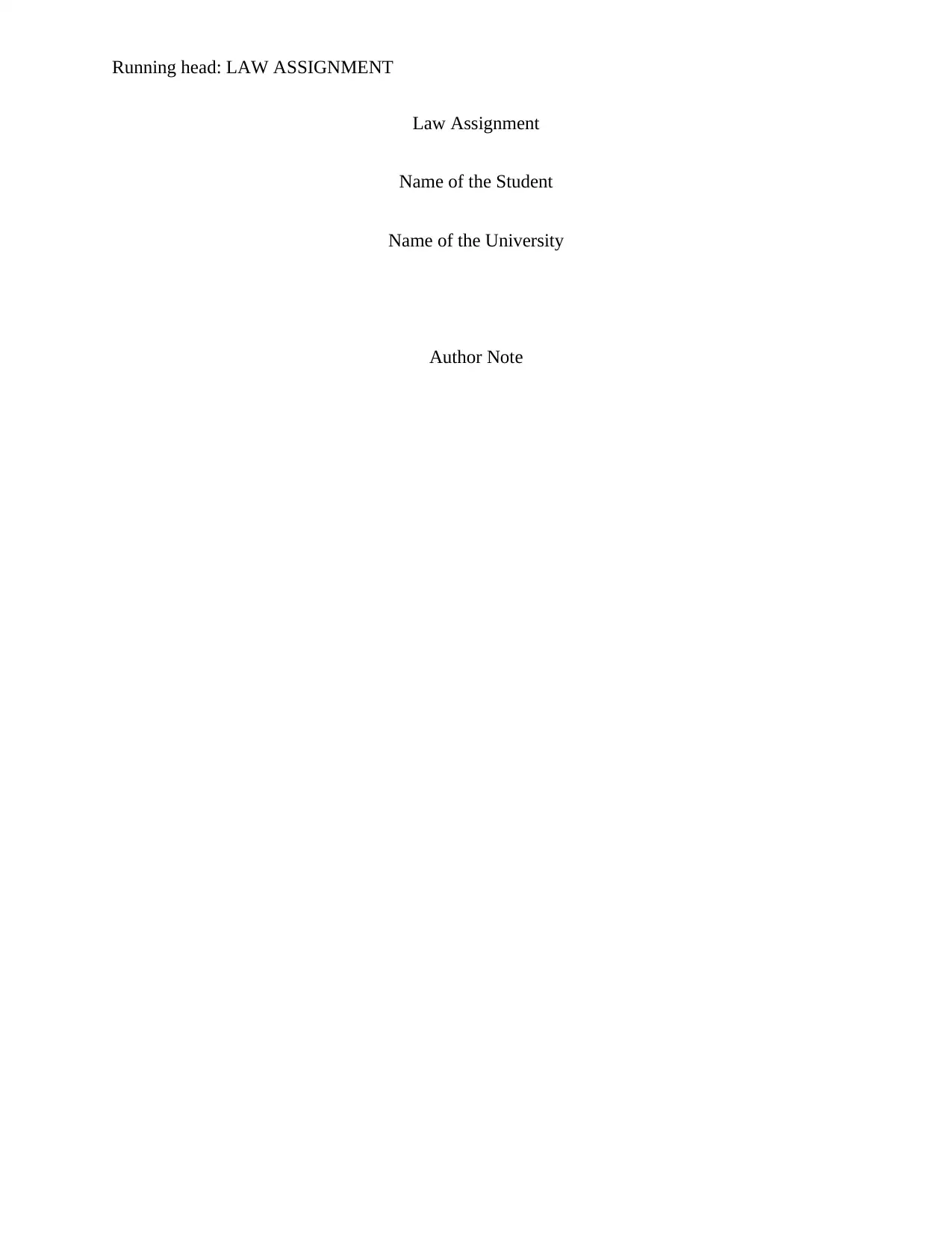
Running head: LAW ASSIGNMENT
Law Assignment
Name of the Student
Name of the University
Author Note
Law Assignment
Name of the Student
Name of the University
Author Note
Secure Best Marks with AI Grader
Need help grading? Try our AI Grader for instant feedback on your assignments.
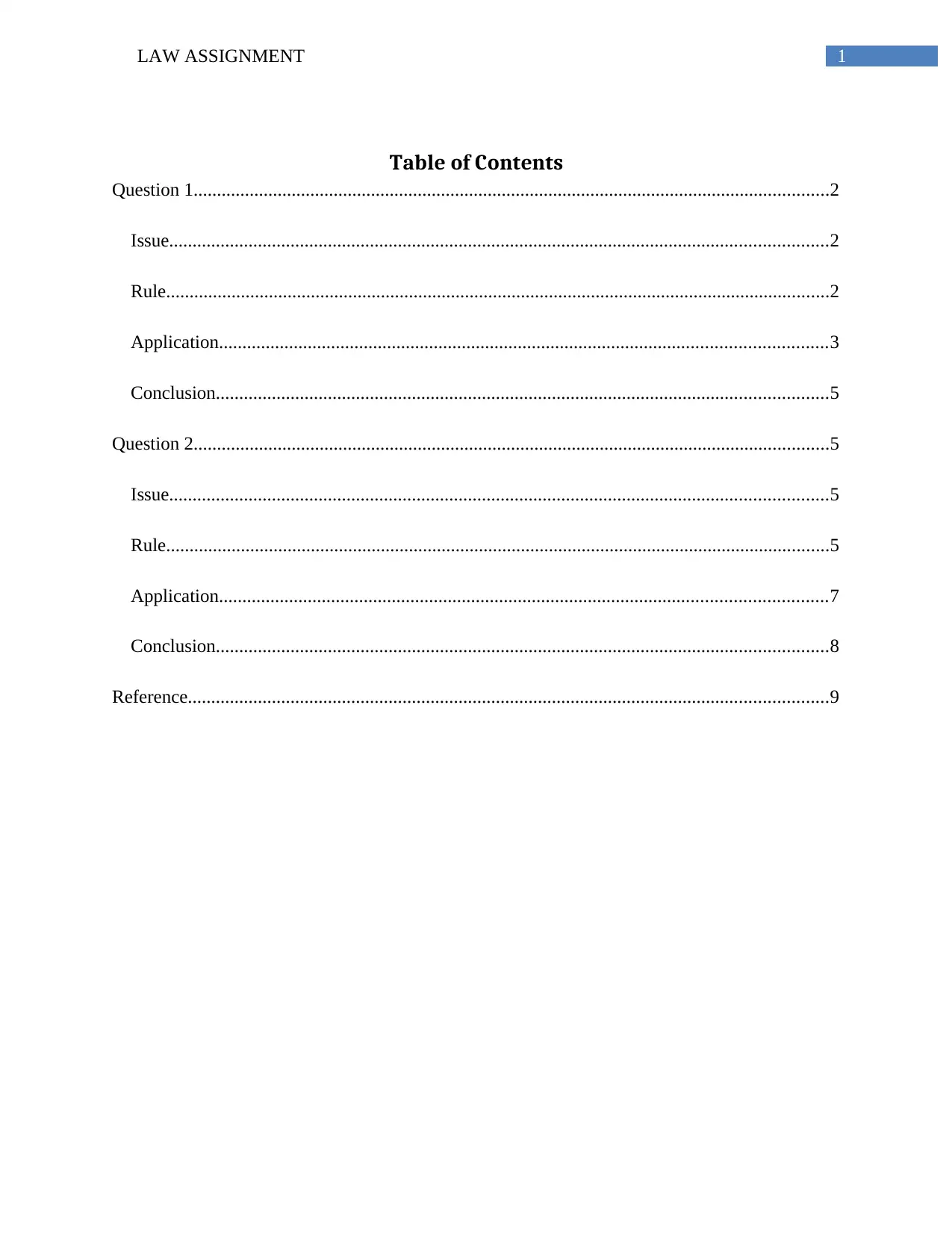
1LAW ASSIGNMENT
Table of Contents
Question 1........................................................................................................................................2
Issue.............................................................................................................................................2
Rule..............................................................................................................................................2
Application..................................................................................................................................3
Conclusion...................................................................................................................................5
Question 2........................................................................................................................................5
Issue.............................................................................................................................................5
Rule..............................................................................................................................................5
Application..................................................................................................................................7
Conclusion...................................................................................................................................8
Reference.........................................................................................................................................9
Table of Contents
Question 1........................................................................................................................................2
Issue.............................................................................................................................................2
Rule..............................................................................................................................................2
Application..................................................................................................................................3
Conclusion...................................................................................................................................5
Question 2........................................................................................................................................5
Issue.............................................................................................................................................5
Rule..............................................................................................................................................5
Application..................................................................................................................................7
Conclusion...................................................................................................................................8
Reference.........................................................................................................................................9
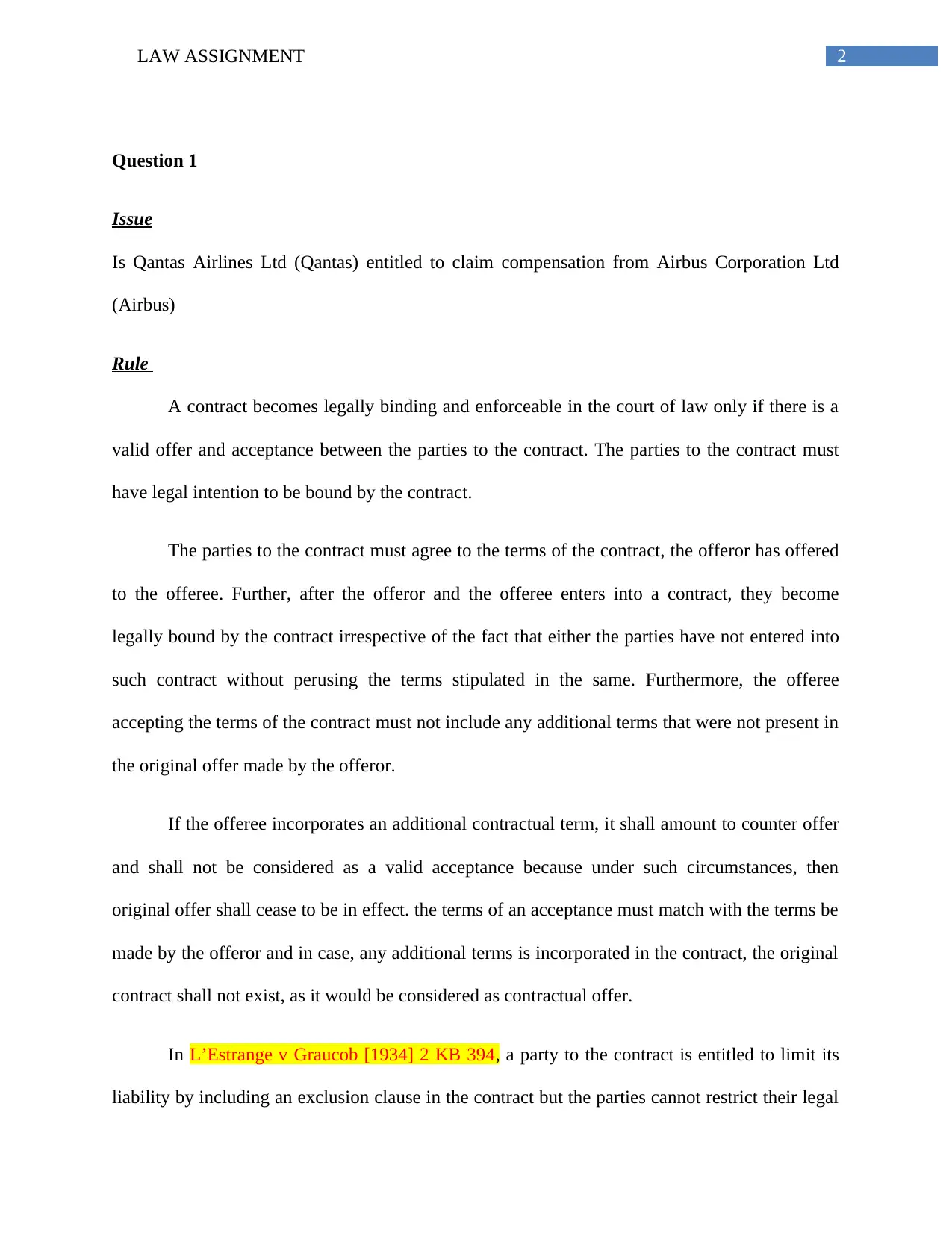
2LAW ASSIGNMENT
Question 1
Issue
Is Qantas Airlines Ltd (Qantas) entitled to claim compensation from Airbus Corporation Ltd
(Airbus)
Rule
A contract becomes legally binding and enforceable in the court of law only if there is a
valid offer and acceptance between the parties to the contract. The parties to the contract must
have legal intention to be bound by the contract.
The parties to the contract must agree to the terms of the contract, the offeror has offered
to the offeree. Further, after the offeror and the offeree enters into a contract, they become
legally bound by the contract irrespective of the fact that either the parties have not entered into
such contract without perusing the terms stipulated in the same. Furthermore, the offeree
accepting the terms of the contract must not include any additional terms that were not present in
the original offer made by the offeror.
If the offeree incorporates an additional contractual term, it shall amount to counter offer
and shall not be considered as a valid acceptance because under such circumstances, then
original offer shall cease to be in effect. the terms of an acceptance must match with the terms be
made by the offeror and in case, any additional terms is incorporated in the contract, the original
contract shall not exist, as it would be considered as contractual offer.
In L’Estrange v Graucob [1934] 2 KB 394, a party to the contract is entitled to limit its
liability by including an exclusion clause in the contract but the parties cannot restrict their legal
Question 1
Issue
Is Qantas Airlines Ltd (Qantas) entitled to claim compensation from Airbus Corporation Ltd
(Airbus)
Rule
A contract becomes legally binding and enforceable in the court of law only if there is a
valid offer and acceptance between the parties to the contract. The parties to the contract must
have legal intention to be bound by the contract.
The parties to the contract must agree to the terms of the contract, the offeror has offered
to the offeree. Further, after the offeror and the offeree enters into a contract, they become
legally bound by the contract irrespective of the fact that either the parties have not entered into
such contract without perusing the terms stipulated in the same. Furthermore, the offeree
accepting the terms of the contract must not include any additional terms that were not present in
the original offer made by the offeror.
If the offeree incorporates an additional contractual term, it shall amount to counter offer
and shall not be considered as a valid acceptance because under such circumstances, then
original offer shall cease to be in effect. the terms of an acceptance must match with the terms be
made by the offeror and in case, any additional terms is incorporated in the contract, the original
contract shall not exist, as it would be considered as contractual offer.
In L’Estrange v Graucob [1934] 2 KB 394, a party to the contract is entitled to limit its
liability by including an exclusion clause in the contract but the parties cannot restrict their legal
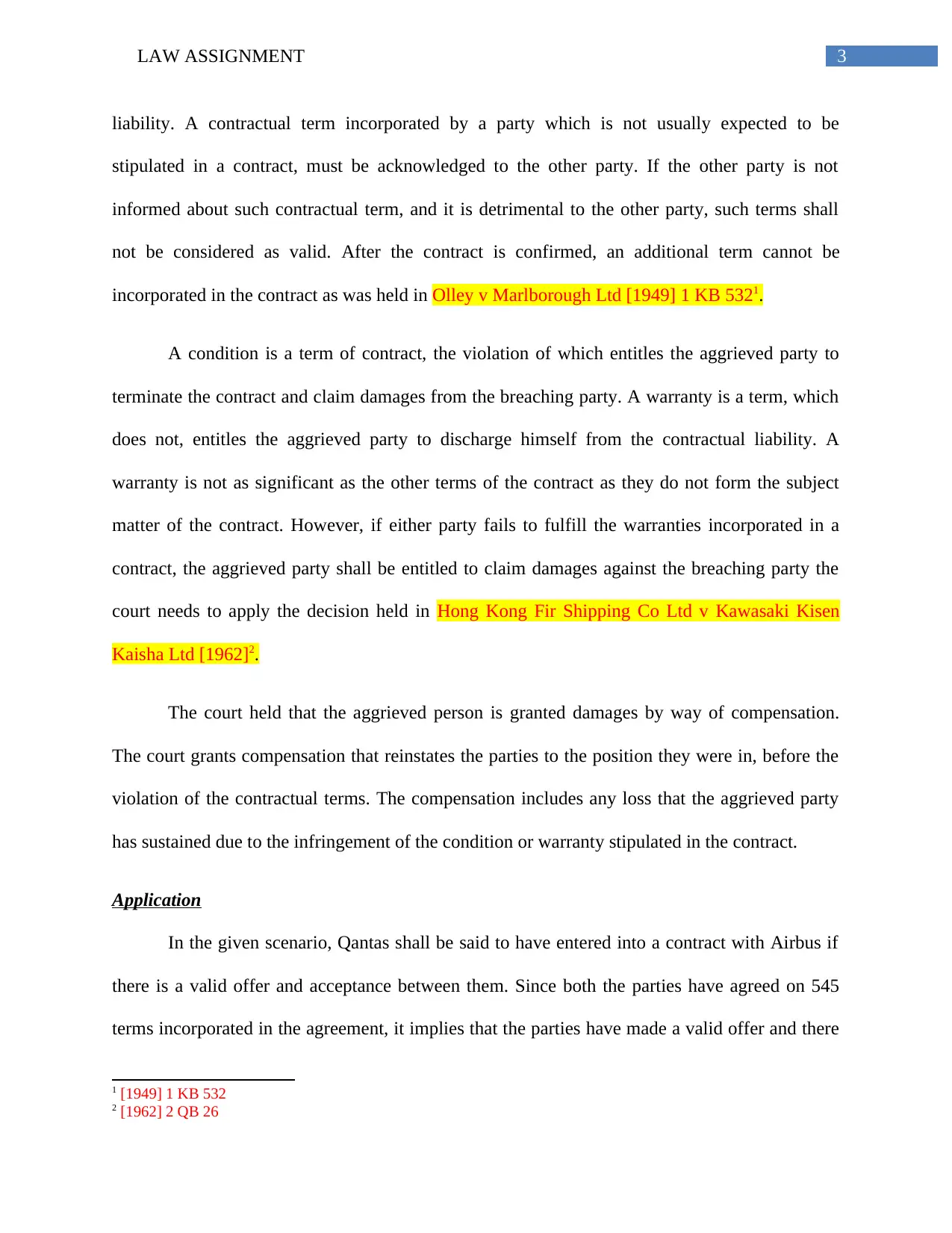
3LAW ASSIGNMENT
liability. A contractual term incorporated by a party which is not usually expected to be
stipulated in a contract, must be acknowledged to the other party. If the other party is not
informed about such contractual term, and it is detrimental to the other party, such terms shall
not be considered as valid. After the contract is confirmed, an additional term cannot be
incorporated in the contract as was held in Olley v Marlborough Ltd [1949] 1 KB 5321.
A condition is a term of contract, the violation of which entitles the aggrieved party to
terminate the contract and claim damages from the breaching party. A warranty is a term, which
does not, entitles the aggrieved party to discharge himself from the contractual liability. A
warranty is not as significant as the other terms of the contract as they do not form the subject
matter of the contract. However, if either party fails to fulfill the warranties incorporated in a
contract, the aggrieved party shall be entitled to claim damages against the breaching party the
court needs to apply the decision held in Hong Kong Fir Shipping Co Ltd v Kawasaki Kisen
Kaisha Ltd [1962]2.
The court held that the aggrieved person is granted damages by way of compensation.
The court grants compensation that reinstates the parties to the position they were in, before the
violation of the contractual terms. The compensation includes any loss that the aggrieved party
has sustained due to the infringement of the condition or warranty stipulated in the contract.
Application
In the given scenario, Qantas shall be said to have entered into a contract with Airbus if
there is a valid offer and acceptance between them. Since both the parties have agreed on 545
terms incorporated in the agreement, it implies that the parties have made a valid offer and there
1 [1949] 1 KB 532
2 [1962] 2 QB 26
liability. A contractual term incorporated by a party which is not usually expected to be
stipulated in a contract, must be acknowledged to the other party. If the other party is not
informed about such contractual term, and it is detrimental to the other party, such terms shall
not be considered as valid. After the contract is confirmed, an additional term cannot be
incorporated in the contract as was held in Olley v Marlborough Ltd [1949] 1 KB 5321.
A condition is a term of contract, the violation of which entitles the aggrieved party to
terminate the contract and claim damages from the breaching party. A warranty is a term, which
does not, entitles the aggrieved party to discharge himself from the contractual liability. A
warranty is not as significant as the other terms of the contract as they do not form the subject
matter of the contract. However, if either party fails to fulfill the warranties incorporated in a
contract, the aggrieved party shall be entitled to claim damages against the breaching party the
court needs to apply the decision held in Hong Kong Fir Shipping Co Ltd v Kawasaki Kisen
Kaisha Ltd [1962]2.
The court held that the aggrieved person is granted damages by way of compensation.
The court grants compensation that reinstates the parties to the position they were in, before the
violation of the contractual terms. The compensation includes any loss that the aggrieved party
has sustained due to the infringement of the condition or warranty stipulated in the contract.
Application
In the given scenario, Qantas shall be said to have entered into a contract with Airbus if
there is a valid offer and acceptance between them. Since both the parties have agreed on 545
terms incorporated in the agreement, it implies that the parties have made a valid offer and there
1 [1949] 1 KB 532
2 [1962] 2 QB 26
Secure Best Marks with AI Grader
Need help grading? Try our AI Grader for instant feedback on your assignments.
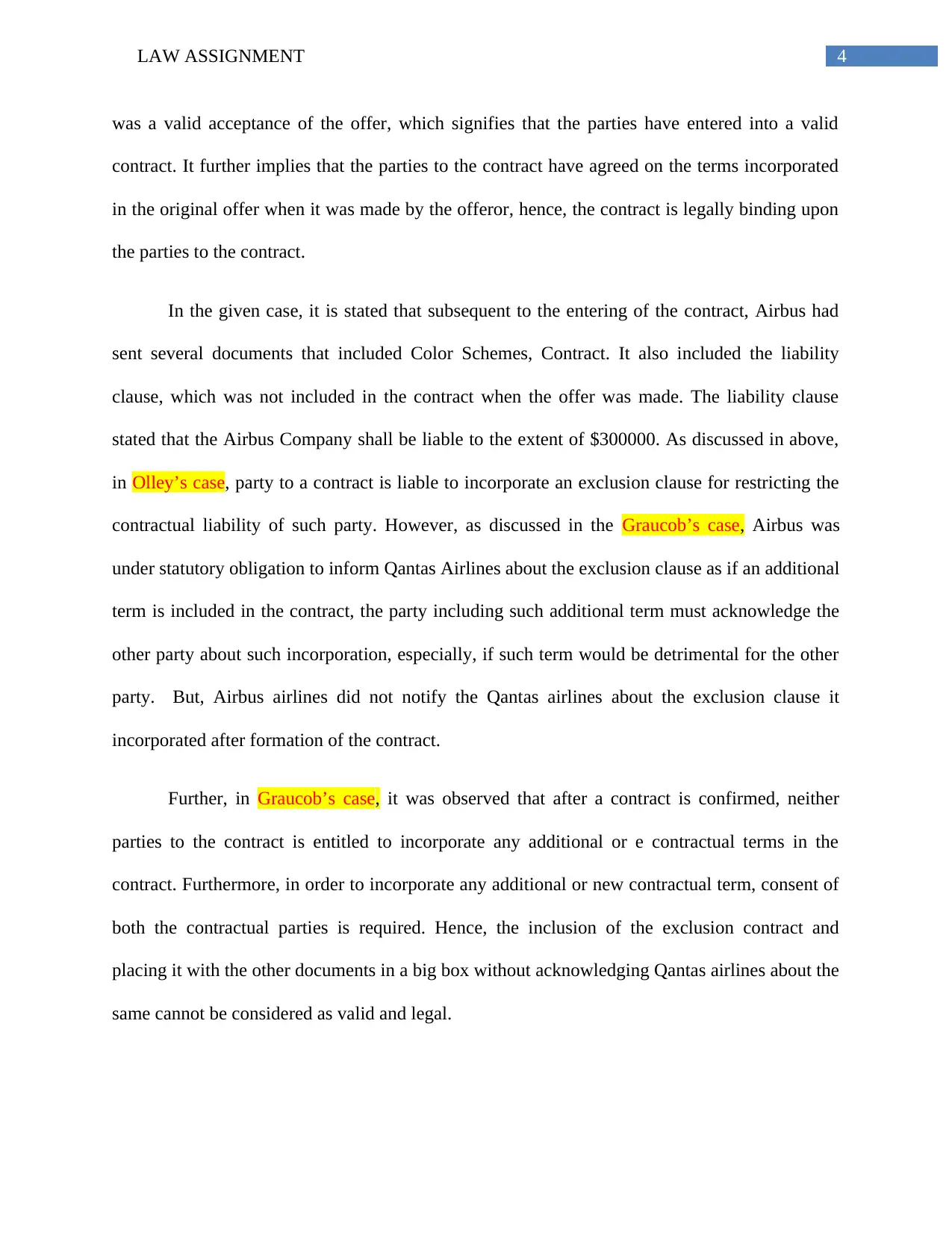
4LAW ASSIGNMENT
was a valid acceptance of the offer, which signifies that the parties have entered into a valid
contract. It further implies that the parties to the contract have agreed on the terms incorporated
in the original offer when it was made by the offeror, hence, the contract is legally binding upon
the parties to the contract.
In the given case, it is stated that subsequent to the entering of the contract, Airbus had
sent several documents that included Color Schemes, Contract. It also included the liability
clause, which was not included in the contract when the offer was made. The liability clause
stated that the Airbus Company shall be liable to the extent of $300000. As discussed in above,
in Olley’s case, party to a contract is liable to incorporate an exclusion clause for restricting the
contractual liability of such party. However, as discussed in the Graucob’s case, Airbus was
under statutory obligation to inform Qantas Airlines about the exclusion clause as if an additional
term is included in the contract, the party including such additional term must acknowledge the
other party about such incorporation, especially, if such term would be detrimental for the other
party. But, Airbus airlines did not notify the Qantas airlines about the exclusion clause it
incorporated after formation of the contract.
Further, in Graucob’s case, it was observed that after a contract is confirmed, neither
parties to the contract is entitled to incorporate any additional or e contractual terms in the
contract. Furthermore, in order to incorporate any additional or new contractual term, consent of
both the contractual parties is required. Hence, the inclusion of the exclusion contract and
placing it with the other documents in a big box without acknowledging Qantas airlines about the
same cannot be considered as valid and legal.
was a valid acceptance of the offer, which signifies that the parties have entered into a valid
contract. It further implies that the parties to the contract have agreed on the terms incorporated
in the original offer when it was made by the offeror, hence, the contract is legally binding upon
the parties to the contract.
In the given case, it is stated that subsequent to the entering of the contract, Airbus had
sent several documents that included Color Schemes, Contract. It also included the liability
clause, which was not included in the contract when the offer was made. The liability clause
stated that the Airbus Company shall be liable to the extent of $300000. As discussed in above,
in Olley’s case, party to a contract is liable to incorporate an exclusion clause for restricting the
contractual liability of such party. However, as discussed in the Graucob’s case, Airbus was
under statutory obligation to inform Qantas Airlines about the exclusion clause as if an additional
term is included in the contract, the party including such additional term must acknowledge the
other party about such incorporation, especially, if such term would be detrimental for the other
party. But, Airbus airlines did not notify the Qantas airlines about the exclusion clause it
incorporated after formation of the contract.
Further, in Graucob’s case, it was observed that after a contract is confirmed, neither
parties to the contract is entitled to incorporate any additional or e contractual terms in the
contract. Furthermore, in order to incorporate any additional or new contractual term, consent of
both the contractual parties is required. Hence, the inclusion of the exclusion contract and
placing it with the other documents in a big box without acknowledging Qantas airlines about the
same cannot be considered as valid and legal.
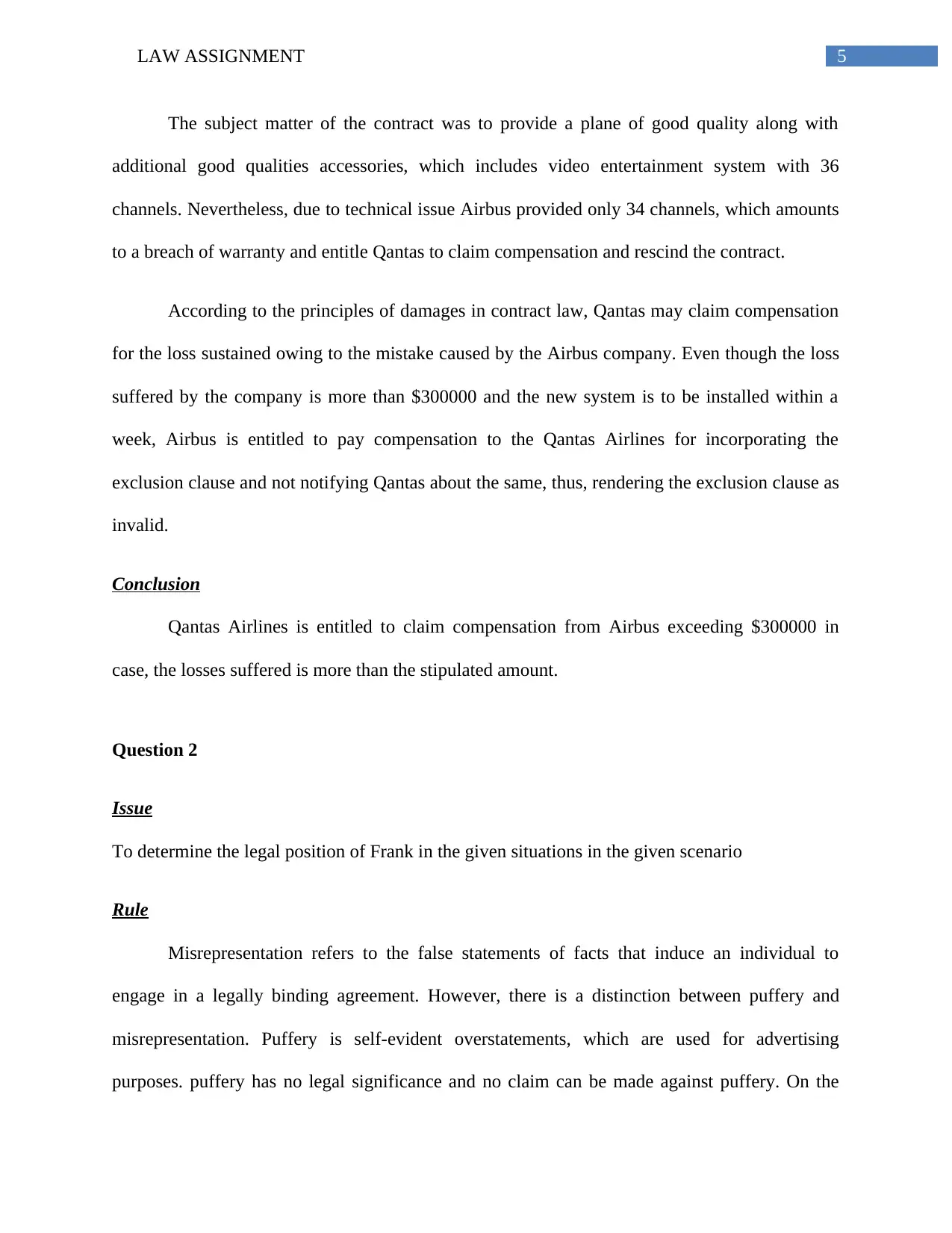
5LAW ASSIGNMENT
The subject matter of the contract was to provide a plane of good quality along with
additional good qualities accessories, which includes video entertainment system with 36
channels. Nevertheless, due to technical issue Airbus provided only 34 channels, which amounts
to a breach of warranty and entitle Qantas to claim compensation and rescind the contract.
According to the principles of damages in contract law, Qantas may claim compensation
for the loss sustained owing to the mistake caused by the Airbus company. Even though the loss
suffered by the company is more than $300000 and the new system is to be installed within a
week, Airbus is entitled to pay compensation to the Qantas Airlines for incorporating the
exclusion clause and not notifying Qantas about the same, thus, rendering the exclusion clause as
invalid.
Conclusion
Qantas Airlines is entitled to claim compensation from Airbus exceeding $300000 in
case, the losses suffered is more than the stipulated amount.
Question 2
Issue
To determine the legal position of Frank in the given situations in the given scenario
Rule
Misrepresentation refers to the false statements of facts that induce an individual to
engage in a legally binding agreement. However, there is a distinction between puffery and
misrepresentation. Puffery is self-evident overstatements, which are used for advertising
purposes. puffery has no legal significance and no claim can be made against puffery. On the
The subject matter of the contract was to provide a plane of good quality along with
additional good qualities accessories, which includes video entertainment system with 36
channels. Nevertheless, due to technical issue Airbus provided only 34 channels, which amounts
to a breach of warranty and entitle Qantas to claim compensation and rescind the contract.
According to the principles of damages in contract law, Qantas may claim compensation
for the loss sustained owing to the mistake caused by the Airbus company. Even though the loss
suffered by the company is more than $300000 and the new system is to be installed within a
week, Airbus is entitled to pay compensation to the Qantas Airlines for incorporating the
exclusion clause and not notifying Qantas about the same, thus, rendering the exclusion clause as
invalid.
Conclusion
Qantas Airlines is entitled to claim compensation from Airbus exceeding $300000 in
case, the losses suffered is more than the stipulated amount.
Question 2
Issue
To determine the legal position of Frank in the given situations in the given scenario
Rule
Misrepresentation refers to the false statements of facts that induce an individual to
engage in a legally binding agreement. However, there is a distinction between puffery and
misrepresentation. Puffery is self-evident overstatements, which are used for advertising
purposes. puffery has no legal significance and no claim can be made against puffery. On the
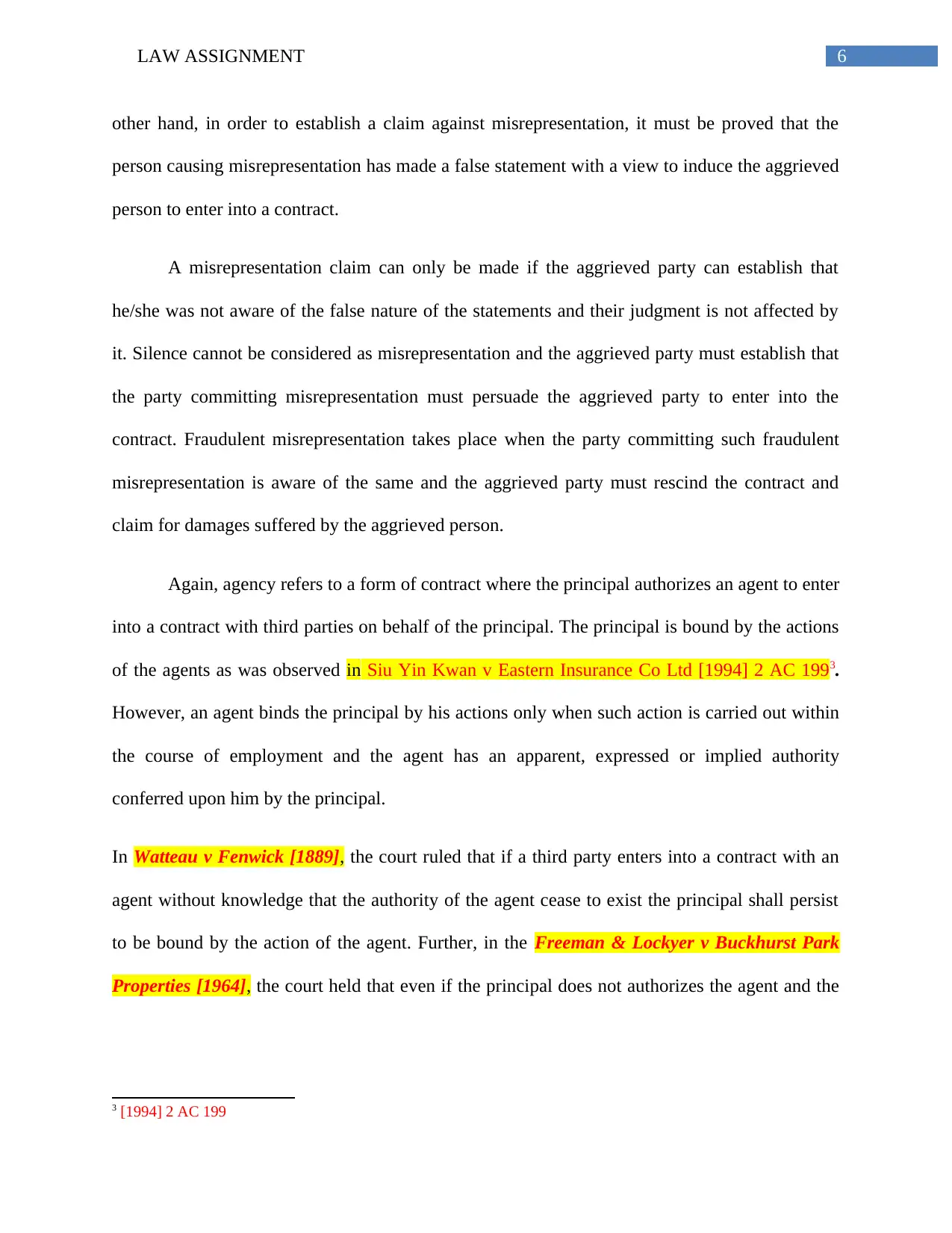
6LAW ASSIGNMENT
other hand, in order to establish a claim against misrepresentation, it must be proved that the
person causing misrepresentation has made a false statement with a view to induce the aggrieved
person to enter into a contract.
A misrepresentation claim can only be made if the aggrieved party can establish that
he/she was not aware of the false nature of the statements and their judgment is not affected by
it. Silence cannot be considered as misrepresentation and the aggrieved party must establish that
the party committing misrepresentation must persuade the aggrieved party to enter into the
contract. Fraudulent misrepresentation takes place when the party committing such fraudulent
misrepresentation is aware of the same and the aggrieved party must rescind the contract and
claim for damages suffered by the aggrieved person.
Again, agency refers to a form of contract where the principal authorizes an agent to enter
into a contract with third parties on behalf of the principal. The principal is bound by the actions
of the agents as was observed in Siu Yin Kwan v Eastern Insurance Co Ltd [1994] 2 AC 1993.
However, an agent binds the principal by his actions only when such action is carried out within
the course of employment and the agent has an apparent, expressed or implied authority
conferred upon him by the principal.
In Watteau v Fenwick [1889], the court ruled that if a third party enters into a contract with an
agent without knowledge that the authority of the agent cease to exist the principal shall persist
to be bound by the action of the agent. Further, in the Freeman & Lockyer v Buckhurst Park
Properties [1964], the court held that even if the principal does not authorizes the agent and the
3 [1994] 2 AC 199
other hand, in order to establish a claim against misrepresentation, it must be proved that the
person causing misrepresentation has made a false statement with a view to induce the aggrieved
person to enter into a contract.
A misrepresentation claim can only be made if the aggrieved party can establish that
he/she was not aware of the false nature of the statements and their judgment is not affected by
it. Silence cannot be considered as misrepresentation and the aggrieved party must establish that
the party committing misrepresentation must persuade the aggrieved party to enter into the
contract. Fraudulent misrepresentation takes place when the party committing such fraudulent
misrepresentation is aware of the same and the aggrieved party must rescind the contract and
claim for damages suffered by the aggrieved person.
Again, agency refers to a form of contract where the principal authorizes an agent to enter
into a contract with third parties on behalf of the principal. The principal is bound by the actions
of the agents as was observed in Siu Yin Kwan v Eastern Insurance Co Ltd [1994] 2 AC 1993.
However, an agent binds the principal by his actions only when such action is carried out within
the course of employment and the agent has an apparent, expressed or implied authority
conferred upon him by the principal.
In Watteau v Fenwick [1889], the court ruled that if a third party enters into a contract with an
agent without knowledge that the authority of the agent cease to exist the principal shall persist
to be bound by the action of the agent. Further, in the Freeman & Lockyer v Buckhurst Park
Properties [1964], the court held that even if the principal does not authorizes the agent and the
3 [1994] 2 AC 199
Paraphrase This Document
Need a fresh take? Get an instant paraphrase of this document with our AI Paraphraser
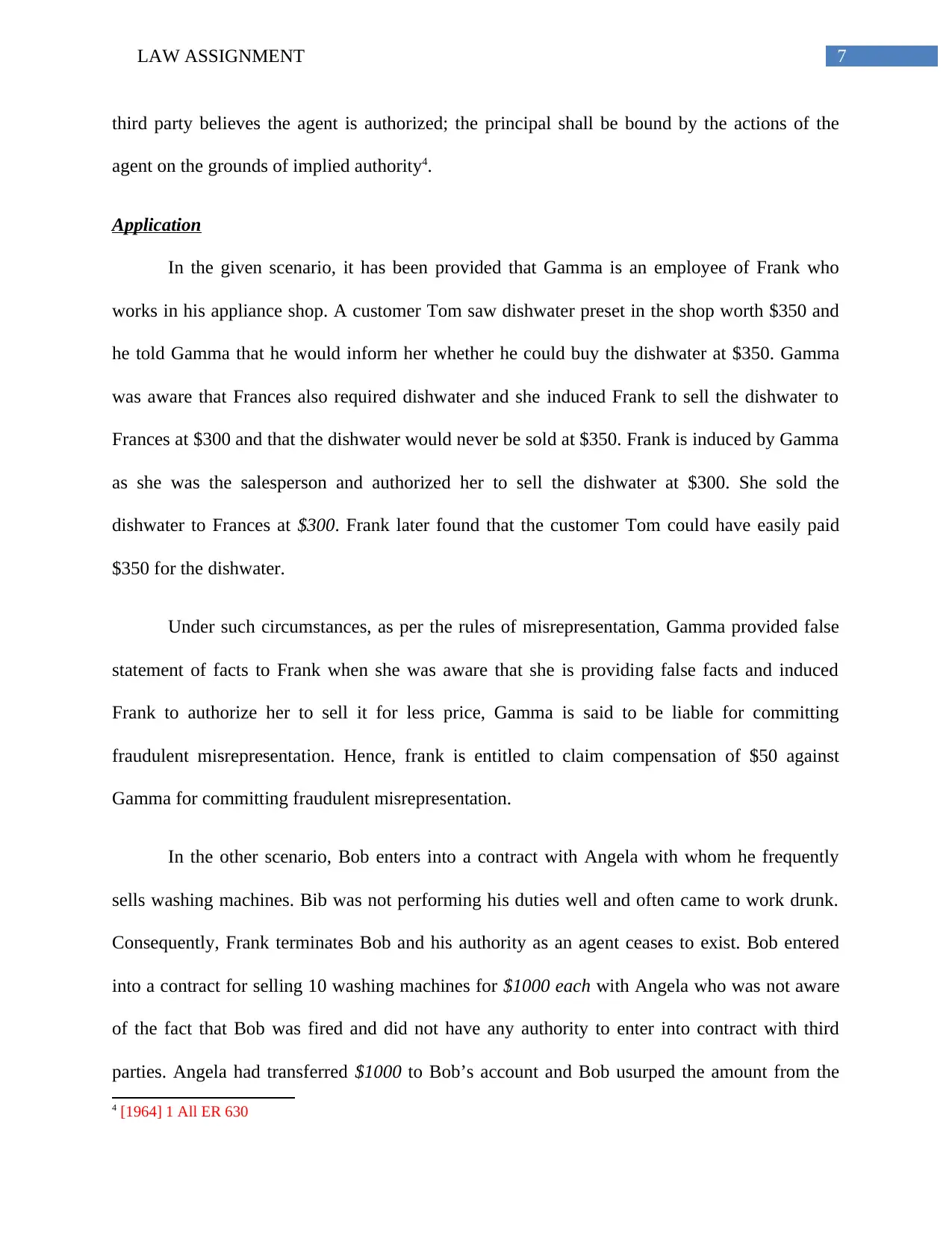
7LAW ASSIGNMENT
third party believes the agent is authorized; the principal shall be bound by the actions of the
agent on the grounds of implied authority4.
Application
In the given scenario, it has been provided that Gamma is an employee of Frank who
works in his appliance shop. A customer Tom saw dishwater preset in the shop worth $350 and
he told Gamma that he would inform her whether he could buy the dishwater at $350. Gamma
was aware that Frances also required dishwater and she induced Frank to sell the dishwater to
Frances at $300 and that the dishwater would never be sold at $350. Frank is induced by Gamma
as she was the salesperson and authorized her to sell the dishwater at $300. She sold the
dishwater to Frances at $300. Frank later found that the customer Tom could have easily paid
$350 for the dishwater.
Under such circumstances, as per the rules of misrepresentation, Gamma provided false
statement of facts to Frank when she was aware that she is providing false facts and induced
Frank to authorize her to sell it for less price, Gamma is said to be liable for committing
fraudulent misrepresentation. Hence, frank is entitled to claim compensation of $50 against
Gamma for committing fraudulent misrepresentation.
In the other scenario, Bob enters into a contract with Angela with whom he frequently
sells washing machines. Bib was not performing his duties well and often came to work drunk.
Consequently, Frank terminates Bob and his authority as an agent ceases to exist. Bob entered
into a contract for selling 10 washing machines for $1000 each with Angela who was not aware
of the fact that Bob was fired and did not have any authority to enter into contract with third
parties. Angela had transferred $1000 to Bob’s account and Bob usurped the amount from the
4 [1964] 1 All ER 630
third party believes the agent is authorized; the principal shall be bound by the actions of the
agent on the grounds of implied authority4.
Application
In the given scenario, it has been provided that Gamma is an employee of Frank who
works in his appliance shop. A customer Tom saw dishwater preset in the shop worth $350 and
he told Gamma that he would inform her whether he could buy the dishwater at $350. Gamma
was aware that Frances also required dishwater and she induced Frank to sell the dishwater to
Frances at $300 and that the dishwater would never be sold at $350. Frank is induced by Gamma
as she was the salesperson and authorized her to sell the dishwater at $300. She sold the
dishwater to Frances at $300. Frank later found that the customer Tom could have easily paid
$350 for the dishwater.
Under such circumstances, as per the rules of misrepresentation, Gamma provided false
statement of facts to Frank when she was aware that she is providing false facts and induced
Frank to authorize her to sell it for less price, Gamma is said to be liable for committing
fraudulent misrepresentation. Hence, frank is entitled to claim compensation of $50 against
Gamma for committing fraudulent misrepresentation.
In the other scenario, Bob enters into a contract with Angela with whom he frequently
sells washing machines. Bib was not performing his duties well and often came to work drunk.
Consequently, Frank terminates Bob and his authority as an agent ceases to exist. Bob entered
into a contract for selling 10 washing machines for $1000 each with Angela who was not aware
of the fact that Bob was fired and did not have any authority to enter into contract with third
parties. Angela had transferred $1000 to Bob’s account and Bob usurped the amount from the
4 [1964] 1 All ER 630
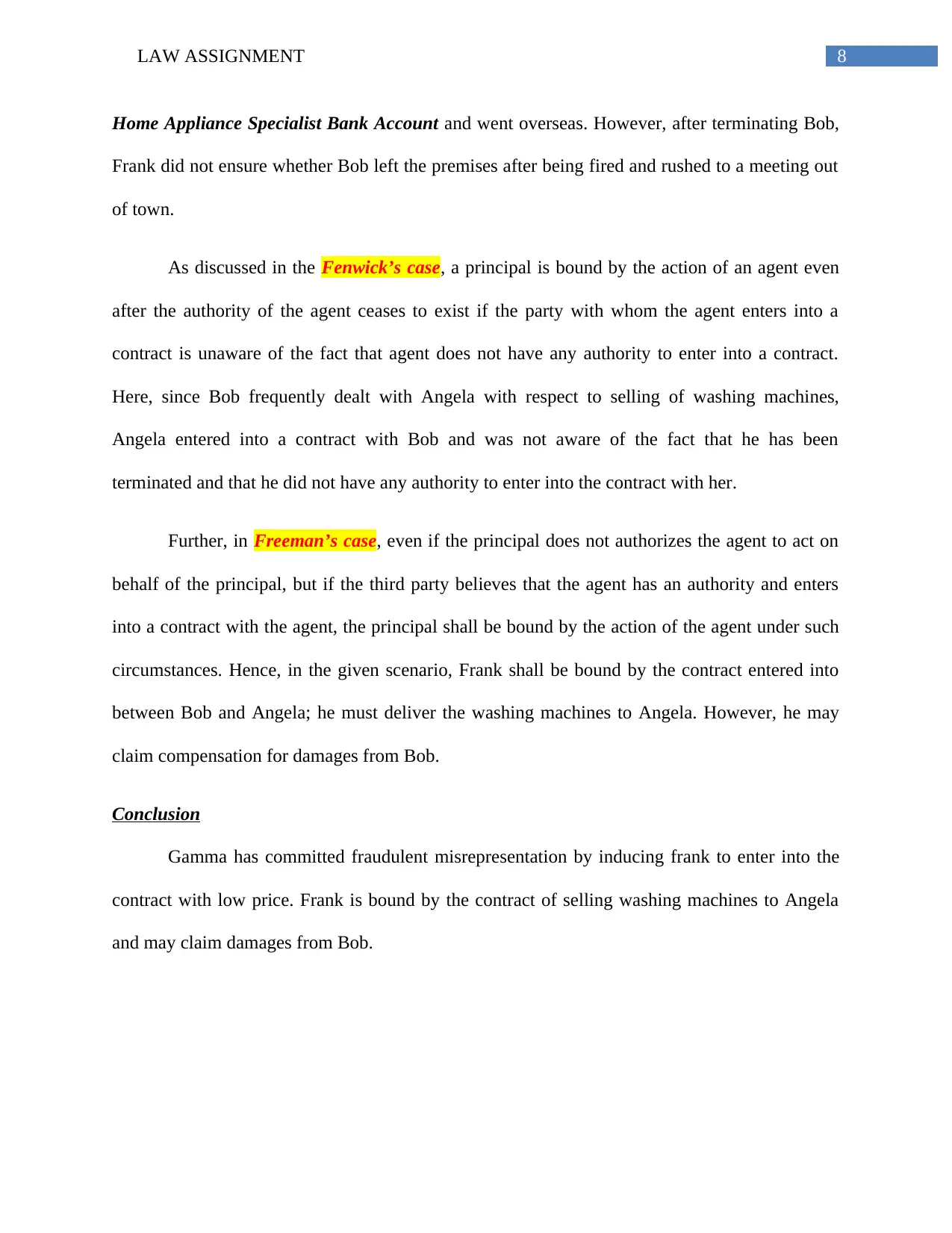
8LAW ASSIGNMENT
Home Appliance Specialist Bank Account and went overseas. However, after terminating Bob,
Frank did not ensure whether Bob left the premises after being fired and rushed to a meeting out
of town.
As discussed in the Fenwick’s case, a principal is bound by the action of an agent even
after the authority of the agent ceases to exist if the party with whom the agent enters into a
contract is unaware of the fact that agent does not have any authority to enter into a contract.
Here, since Bob frequently dealt with Angela with respect to selling of washing machines,
Angela entered into a contract with Bob and was not aware of the fact that he has been
terminated and that he did not have any authority to enter into the contract with her.
Further, in Freeman’s case, even if the principal does not authorizes the agent to act on
behalf of the principal, but if the third party believes that the agent has an authority and enters
into a contract with the agent, the principal shall be bound by the action of the agent under such
circumstances. Hence, in the given scenario, Frank shall be bound by the contract entered into
between Bob and Angela; he must deliver the washing machines to Angela. However, he may
claim compensation for damages from Bob.
Conclusion
Gamma has committed fraudulent misrepresentation by inducing frank to enter into the
contract with low price. Frank is bound by the contract of selling washing machines to Angela
and may claim damages from Bob.
Home Appliance Specialist Bank Account and went overseas. However, after terminating Bob,
Frank did not ensure whether Bob left the premises after being fired and rushed to a meeting out
of town.
As discussed in the Fenwick’s case, a principal is bound by the action of an agent even
after the authority of the agent ceases to exist if the party with whom the agent enters into a
contract is unaware of the fact that agent does not have any authority to enter into a contract.
Here, since Bob frequently dealt with Angela with respect to selling of washing machines,
Angela entered into a contract with Bob and was not aware of the fact that he has been
terminated and that he did not have any authority to enter into the contract with her.
Further, in Freeman’s case, even if the principal does not authorizes the agent to act on
behalf of the principal, but if the third party believes that the agent has an authority and enters
into a contract with the agent, the principal shall be bound by the action of the agent under such
circumstances. Hence, in the given scenario, Frank shall be bound by the contract entered into
between Bob and Angela; he must deliver the washing machines to Angela. However, he may
claim compensation for damages from Bob.
Conclusion
Gamma has committed fraudulent misrepresentation by inducing frank to enter into the
contract with low price. Frank is bound by the contract of selling washing machines to Angela
and may claim damages from Bob.
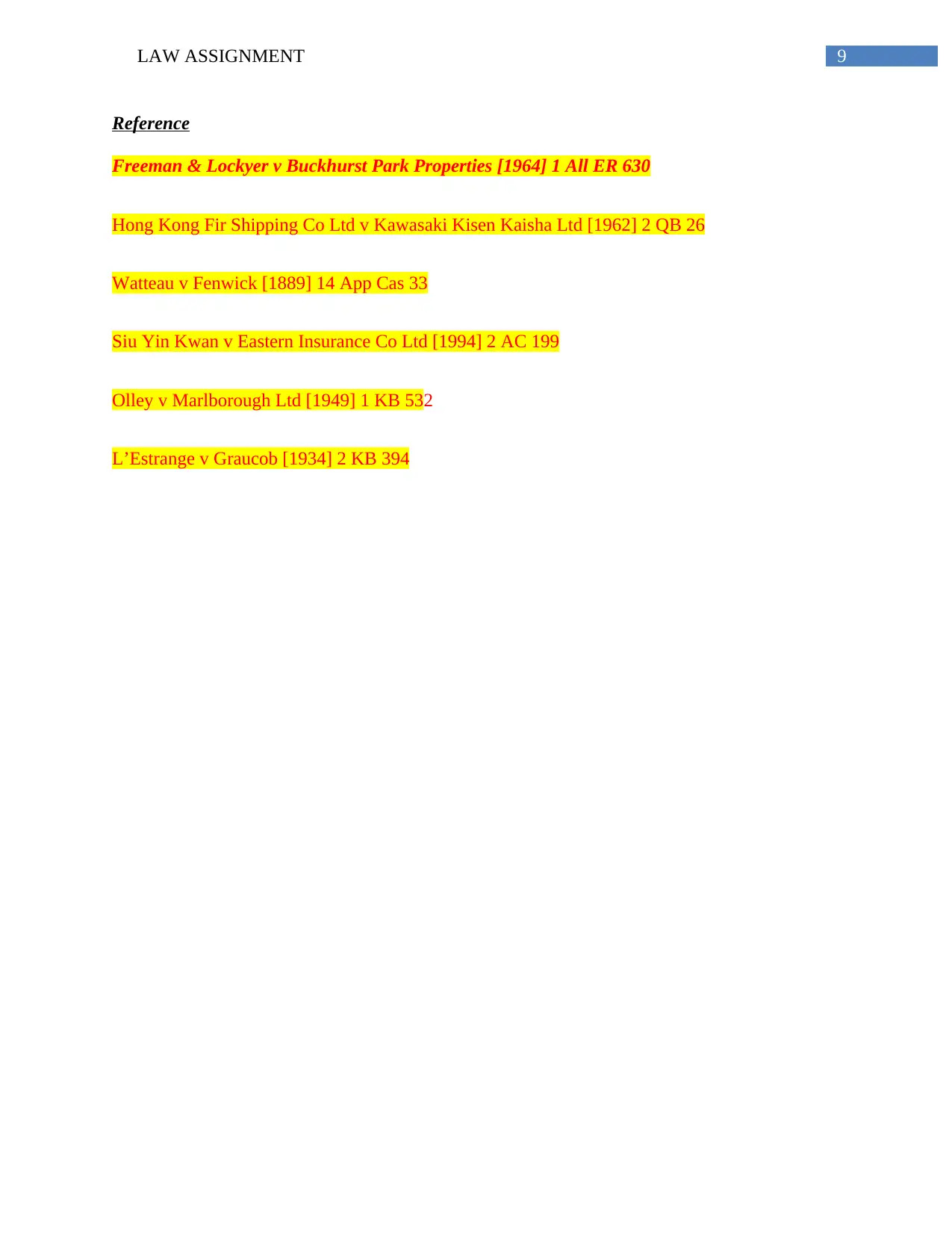
9LAW ASSIGNMENT
Reference
Freeman & Lockyer v Buckhurst Park Properties [1964] 1 All ER 630
Hong Kong Fir Shipping Co Ltd v Kawasaki Kisen Kaisha Ltd [1962] 2 QB 26
Watteau v Fenwick [1889] 14 App Cas 33
Siu Yin Kwan v Eastern Insurance Co Ltd [1994] 2 AC 199
Olley v Marlborough Ltd [1949] 1 KB 532
L’Estrange v Graucob [1934] 2 KB 394
Reference
Freeman & Lockyer v Buckhurst Park Properties [1964] 1 All ER 630
Hong Kong Fir Shipping Co Ltd v Kawasaki Kisen Kaisha Ltd [1962] 2 QB 26
Watteau v Fenwick [1889] 14 App Cas 33
Siu Yin Kwan v Eastern Insurance Co Ltd [1994] 2 AC 199
Olley v Marlborough Ltd [1949] 1 KB 532
L’Estrange v Graucob [1934] 2 KB 394
Secure Best Marks with AI Grader
Need help grading? Try our AI Grader for instant feedback on your assignments.

10LAW ASSIGNMENT

11LAW ASSIGNMENT
1 out of 12
Related Documents
Your All-in-One AI-Powered Toolkit for Academic Success.
+13062052269
info@desklib.com
Available 24*7 on WhatsApp / Email
![[object Object]](/_next/static/media/star-bottom.7253800d.svg)
Unlock your academic potential
© 2024 | Zucol Services PVT LTD | All rights reserved.





